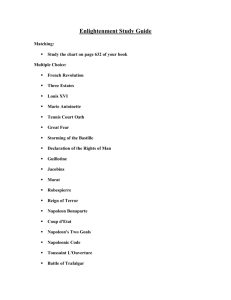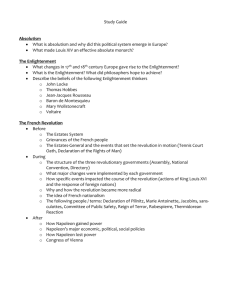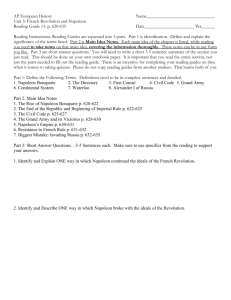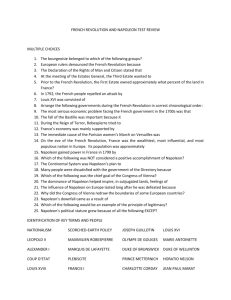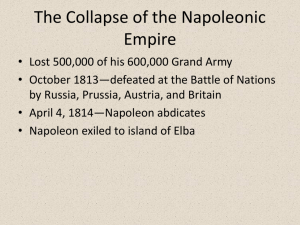Review Day 6
advertisement
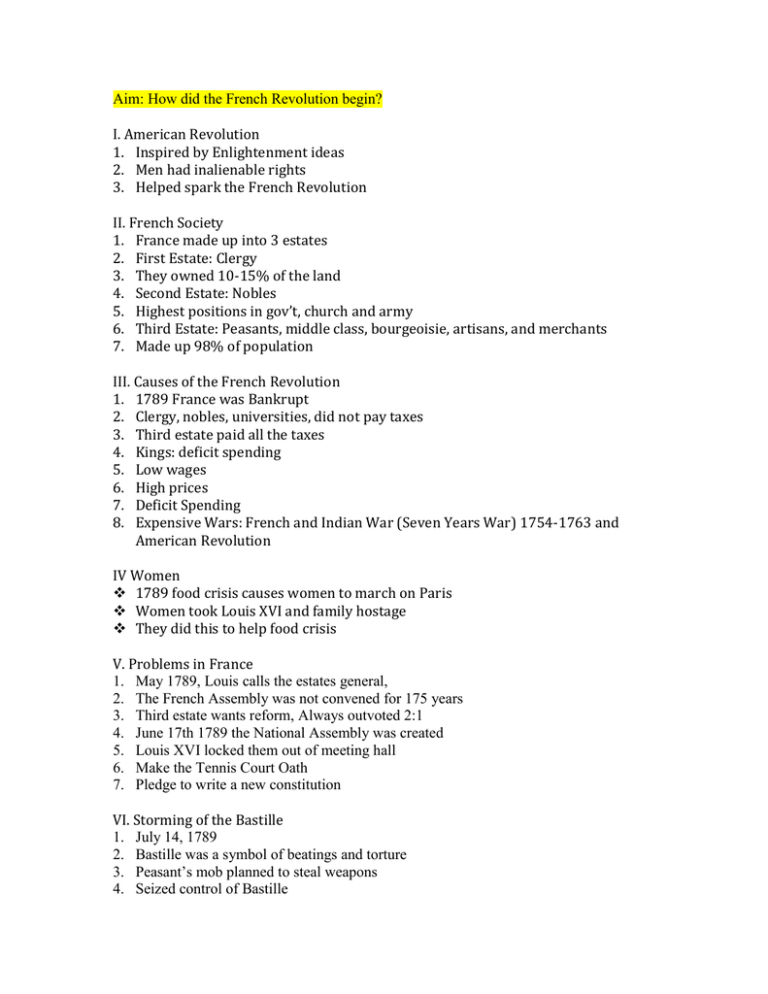
Aim: How did the French Revolution begin? I. American Revolution 1. Inspired by Enlightenment ideas 2. Men had inalienable rights 3. Helped spark the French Revolution II. French Society 1. France made up into 3 estates 2. First Estate: Clergy 3. They owned 10-15% of the land 4. Second Estate: Nobles 5. Highest positions in gov’t, church and army 6. Third Estate: Peasants, middle class, bourgeoisie, artisans, and merchants 7. Made up 98% of population III. Causes of the French Revolution 1. 1789 France was Bankrupt 2. Clergy, nobles, universities, did not pay taxes 3. Third estate paid all the taxes 4. Kings: deficit spending 5. Low wages 6. High prices 7. Deficit Spending 8. Expensive Wars: French and Indian War (Seven Years War) 1754-1763 and American Revolution IV Women 1789 food crisis causes women to march on Paris Women took Louis XVI and family hostage They did this to help food crisis V. Problems in France 1. May 1789, Louis calls the estates general, 2. The French Assembly was not convened for 175 years 3. Third estate wants reform, Always outvoted 2:1 4. June 17th 1789 the National Assembly was created 5. Louis XVI locked them out of meeting hall 6. Make the Tennis Court Oath 7. Pledge to write a new constitution VI. Storming of the Bastille 1. July 14, 1789 2. Bastille was a symbol of beatings and torture 3. Peasant’s mob planned to steal weapons 4. Seized control of Bastille 5. The Bastille surrenders; the head of the Bastille was killed 6. Started the French Revolution VII. National Assembly 1. 1789 sign the Declaration of the Rights of Man 2. Guarantees Liberty, fraternity, Equality 3. 1790 abolished taxes, church privileges, Church gov’t control 4. 1791 Constitution: limited Monarchy, constitutional gov’t 5. Louis XVI fled 6. National convention met to formalize change for France 7. Three sides formed: Moderates, conservatives and radicals 8. Moderates wanted minor changes 9. Conservatives upheld the monarchy, wanted few changes 10. Radicals: opposed the monarchy, wanted many changes 11. National convention taken over by radicals 12. 1793 Louis XVI executed for treason VIII Reign of Terror 1. France becomes a republic in 1793 2. Led by radical group called Jacobins and Maximilien Robespierre 3. Constitution thrown out 4. Committee of public safety had free reign to enforce terror 5. Committee led by Georges Danton 6. Beheaded over 17,000 people with the Guillotine 7. Killed all anti-revolutionaries 8. Danton was seen as being too soft on anti-revolutionaries and executed. 9. Constant abuses of power led to the Thermidorian Reaction. 10. It was a revolt against Robespierre and the Reign of Terror 11. 1795 Robespierre was executed 12. 1795 new constitution 13. Gov’t went back to the public 14. Moderate control 15. Thermidorian reaction led to the creation of a 5 man Directory Aim: How did Napoleon Rise to Power? I. France 1. The Directory: 5 man gov’t 2. 1796: Napoleon General of French army 3. 1798-99 invaded Egypt found Rosetta Stone 4. Deciphered hieroglyphics 5. 1799 stage a coup d’etat to overthrow the gov’t 6. Napoleon became the first consul of France II. Napoleon’s Rule 1. Created the Napoleonic Code, system of laws for internal problems, still used today 2. Equality to men 3. Made fair taxes and national bank 4. Created lycées, public high schools 5. Limited role of women III Napoleon’s Empire 1. Napoleon’s goal was to build an empire 2. Conquered Austria, Prussia, Spain, Portugal, the Holy Roman Empire and Italy 3. 1803 organized German States 4. Sold Louisiana to the United States 5. 1804 crowned himself emperor 6. By 1812 controlled most of Europe (except GB, Sweden and Ottoman Empire) IV. Fall of Napoleon 1. Napoleon made three mistakes A. Britain a. Napoleon planned to hurt GB with the Continental System in 1806 b. Wanted to stop British exports, weakening their economy and then destroy them by war c. At first Russia and other countries obeyed the system, which hurt Britain d. It backfired and hurt France and other countries e. This led to the problems with Russia B. Peninsular War a. 1808-1814 b. Napoleon placed his brother Joseph on the throne of Spain c. The Spanish people rose against France and with British help and force France out of Spain C. Russia a. b. c. d. e. f. g. By 1812 Alexander I refused the Continental system June 1812 Napoleon sends 600,000 soldiers to Russia Russians retreated and used the “scorched earth” defense burned lands to keep French from getting supplies Winter came and French were unprepared and defeated 1814 Napoleon was exiled to Elba French brought in Louis XVIII, brother of Louis XVI V. Final Defeat 1. March 1815 Napoleon returns to France 2. Forces Louis XVIII to flee and retakes the throne 3. Restarted the war against Europe 4. Decisive Battle at Waterloo in June 1815 5. France was defeated by GB and Prussia 6. Exiled to St. Helena, an island near West Africa where he died in 1821 Aim: How successful was the Congress of Vienna in fixing Europe after the French Revolution? I. Congress of Vienna 1. 2. 3. 4. Leaders of European countries met to rebuild Europe Prince Clemons von Metternich of Austria Czar Alexander I of Russia England and France were also represented II. Goals of the Congress A. Balance or power 1. To create a lasting peace by establishing a balance of power 2. Redrew the map of Europe to keep France from rising again Formed a single kingdom of the Netherlands. Norway and Sweden were joined under a single ruler Russia got Finland and control over Poland Austria was given back territory in Germany and Italy France was deprived of all territory conquered by Napoleon Britain gained colonial territories in Africa and control of the seas. B. Restoration of the Monarchies 1. Claimed Legitimacy restoring hereditary monarchs 2. France was restored under the rule of Louis XVIII. 3. Spain under Ferdinand VII 4. Restored kings in Italian states and Portugal Czar Alexander wanted to create a “Holy Alliance” of Christian monarchs to suppress future revolutions; but weakened after Alexander’s death in 1825 III. Problems of the Peace 1. The members redrew the map of Europe without concern for common cultures 2. Nations were split causing nationalism to rise in Europe 3. Peace lasted for 40 years Aim: How did independence become a common theme in Latin America? I. Haiti o The French colony exported coffee, sugar, cocoa and indigo o 90% of the Haitian population was slaves and worked plantations o Pierre Toussaint L’Ouverture and led successful slave revolt o Napoleon sent troops to put down the revolt o L’Ouverture was captured and died o Jean-Jacques Dessalines a former slave and yellow fever, led them to victory o Haiti a free republic and first independent state in Latin America in 1804 II. South America o 1808 Joseph Bonaparte became king of Spain o Simon Bolivar became governor of Venezuela and declared independence from Spain o Bolivar liberates Venezuela 1813 o 1819 Bolívar founded Gran Colombia (Venezuela, Colombia, Panama, and Ecuador) o Named Bolívar president o José de San Martín and Bernardo O’Higgins helped free Chile, Argentina, and Peru. o These men eliminated Spain's presence in South America. III. Brazil o 1807 King John VI of Portugal feared Napoleon and set up court in Brazil o After Napoleon’s death King John VI returned to Portugal o Pedro I declared Brazilian independence and created a constitution. o In 1831 Pedro I abdicated the throne to his 5 year-old son Pedro II. o Reforms: Industrialization, railroads, telegraphs, telephone, and abolition of slavery in 1888 o Republic formed in 1889 IV. Mexico o 1810, Miguel Hidalgo, a Creole priest led a revolt against Spanish rule o The “Cry of Dolores,” set off the Mexican War of Independence o 1811 Hidalgo executed o Jose Morelos continued the revolution and was executed in 1815. o 1821 Treaty of Cordoba forced Spain to recognize Mexico independence Aim: Why did revolutions appear in France and Europe in the early 1800s? I. Revolution of 1830 in France A. Louis XVIII 1. Louis XVIII is reinstated after the French Revolution 2. France received democratic rights like freedom of the press and parliamentary representation 3. Louis XVIII died in 1824 4. Charles X restores absolute monarchy in 1824 5. Restricted free press 6. His restriction of rights led to the July Revolution in 1830 and Charles X fleas 7. Louis Philippe became the new king 8. A new constitution limited the power of the king B. Revolution of 1848 in France • Poor economy • Gov’t corruption caused unrest • Middle Class couldn’t vote. • riots broke out against Louis Philippe • Louis Philippe abdicated the throne and fled to Great Britain • A Second Republic was set up • • • • New constitution: called for an elected president and legislature Louis Napoleon was elected in 1852 the Second Republic became Second Empire New constitution made him absolute ruler Emperor Napoleon III C. Napoleon III 1. Napoleon III started Rapid industrialization in France 2. Development of a network of railroads 3. Struggle for power in Europe because of nationalism 4. Germany wanted unification 5. Franco-Prussian War of 1870 6. Fought over the French-German borderlands in Alsace and Lorraine 7. France was humiliated which ended the reign of Louis Napoleon II. European Revolutions A. 1830 Belgium • Congress of Vienna united the Netherlands and Holland under the Dutch • Belgium did not like being ruled by the Dutch • Belgium: Catholic • Dutch: Protestant • Belgium rebelled and in 1831 was independent B. Poland 1830 • Poland was divided after Congress of Vienna • Poland was controlled by Russia • Russians crushed Polish claim for independence C. Austria and Italy 1848 • Italians revolt against Austrian Rule • They were crushed by the Austrians • Metternich resigns because of chaos in Austria and flees in disguise E. Germany 1848 • 1848: King William of Prussia was offered the crown to unite Germany • Germans wanted national unity and reform • William rejected the offer and crushed German rebellion Aim: 1. How did the Commercial Revolution change the world? ‘ 2. How did Adam Smith’s ideas change business forever? 3. How did Karl Marx challenge Smith? I. Commercial Revolution 1. The Church began to lend money to governments with no interest 2. Merchants created the Joint-stock company 3. People buy stock in a company and share the profits, reduce the costs and risks of colonization. 4. This developed a class of middle class merchants 5. Monarchies granted monopolies to trade routes 6. Muscovy Company of England trade routes to Russia 7. Dutch East India Company controlled the Spice Islands. II. Mercantilism 1. The monopolies led to mercantilism 2. Accumulate wealth, establish colonies and develop industry for a balance of trade. 3. a country tried to export more than it imported 4. Major trading nations built power and wealth 5. Colonies gave the mother country resources 6. This created new markets for exports 7. Mercantilism caused resentment and a demand for colonial independence III. Adam Smith 1. Wrote: The Wealth of Nations to protest mercantilism 2. Laissez-fare: Gov’t should not have a hand in business or “hands off” 3. Businesses should be free to operate without gov’t interference 4. the Free Market: based on supply and demand with little to no gov’t control 5. Inspired Competition: Businessmen would provide the best goods for cheapest price 6. Capitalism: Called for Private and corporate ownership of goods IV Karl Marx 1. German economist and philosopher 2. Factory workers were being exploited by the capitalist system 3. Marx and Friedrich Engels wrote The Communist Manifesto (1848) 4. Working class would eventually revolt and take control of the means of production 5. The gov’t, the courts, the police, the church favor the rich 6. Marxism serves as the foundation of socialism and communism Marxism: economic and political philosophy also known as scientific socialism. Communism a system of social organization in which property and the means of production are held in common. Socialism is the political and economic theory that advocates a system of collective or government ownership and management of the means of production and distribution of goods. Aim: What was the global impact of the Industrial Revolution? I. Agricultural Revolution 1. Inspired the Industrial Revolution 2. appeared in England during the1700s 3. New Inventions 4. Jethro Tull: seed drill and the horse drawn hoe 5. Enclosure Movement: 6. Landowners enclosed public land for their own use, driving out small farmers 7. 3 field system: Charles Townshend 8. This led to a population increase II. Why did the IR start in England? 1. Birth of the I.R mid-1700s 2. Natural Resources: coal and iron 3. Ideal location for the 6 M’s 4. Minds: inventors 5. Managers: entrepreneurs 6. Markets: Trade 7. Manpower: Labor 8. Money: Capital 9. Modes of Transportation 10. Friendly Gov’t III. The Industrial Revolution 1. Cheaper goods and the mass production of goods 2. Birth of major cities and urbanization 3. New inventions 4. Flying Shuttle: John Kay - weave clothe faster 5. Spinning jenny: improved the spinning wheel 6. Water frame: the first powered textile machine. 7. Spinning Mule: allowed greater control over the weaving process 8. Cotton gin: Eli Whitney: machine that separated cottonseed from the cotton fiber 9. Henry Bessemer Steel process 10. The dynamo first electrical generator for industry 11. Steam Engine 12. Created the need for factories 13. Factories at first had to be by water for power 14. Most important invention Railroad IV. Life in Cities 1. Crowded city life 2. No sewage system 3. Disease 4. Pollution 5. Small living space 6. Filthy streets V. Factory System 1. System where workers and machines are brought together to manufacture goods VI. Work in the Factory 1. 2. 3. 4. 5. 6. 7. 8. Unskilled workers Entire family worked: women and children Worked long hours 12-16 a day Sunrise to sunset Low pay No vacations No sick days No holidays VII. Conditions of the factories 1. Hot, dirty, smelly 2. No ventilation 3. Unsafe conditions 4. High chance of bodily mutilation 5. Coal dust and lint air 6. Many accidents 7. Foremen watched constantly 8. Women and children paid lower wages 9. Children mining VIII. Expansion of the Industrial Revolution a. United States 1. Spread to textile industry 2. Railroads led to rapid industrialization 3. After Civil War large corporations appeared b. Continental Europe 1. Belgium and North Germany industrialized in 1830s 2. France industrialized in the 1850s by building railroads 3. Europe had geographic features that held back industrialization in AustriaHungary, Italy and Spain c. Egypt 1. Muhammad Ali improved communication 2. Factories for cloth, sugar, and glass 3. Commercial plantations grew cash crops for European markets d. Russia 1. Trans-Siberian railroad started industrialization in 1904 2. Linked Moscow to the Pacific and East Asia with Western Europe e. Japan 1. Meiji Government industrialized 2. Hired foreign experts to teach the Japanese 3. Railroads, business and technological schools 4. Banks helped by government 5. Japan was the most industrialized land in Asia Aim: How did Otto von Bismarck create the German Empire and unify it as one political state? I. Early Problems of Unification 1. 39 German states ruled by individual princes 2. Princes did not want to lose their power 3. Princes did not want a united Germany. 4. Religion: north were Protestants and south were Catholic II. Otto von Bismarck 1. Prime minister of Prussia 2. Blood and iron, blood meant war and iron meant absolute monarchy 3. Stated: wars would unite the German people 4. Started 3 Wars 1. 2. 3. 4. 5. A. Schleswig & Holstein 1864 Prussia &Austria fought Denmark Prussia & Austria won the war. Denmark lost Schleswig & Holstein Schleswig was controlled by Prussia Holstein by Austria 1. 2. 3. 4. 5. B. Austro-Prussian War 1866 Prussian army entered Holstein After seven weeks Austria was defeated Two states belonged to Prussia. Northern part of Germany was united 1867 the North German Confederation was established. C. Franco-Prussian War 1. Two Reasons for Franco-Prussian War Napoleon III was afraid of how rapidly Prussian power was growing Fighting over the Spanish throne 2. Spanish throne had been vacant since 1868 3. Spain offered the throne to the German prince 4. Napoleon III convinced Wilhelm to reject the throne 5. The Ems Dispatch stated Wilhelm’s rejection 6. Bismarck changed the document and published a fake letter 7. July 19, 1870 The Franco-Prussian war had begun. 8. Germany won in 1871 9. France gave Alsace and Lorraine to Germany 10. France was also forced to pay a lot of money to Germany 11. Germany was united III. Maintaining and Empire 1. Bismarck was its first chancellor 2. 1872, he formed the Three Emperors’ League, Germany, Austria-Hungary, and Russia 3. King Wilhelm I of Prussia became the Kaiser, of emperor of all Germany 4. After Wilhelm I died, his son Frederick III took over 5. William II took over in 1888 Bismarck was dismissed in 1890 Aim: How did the Jewish people gain their own political state in the land of Palestine? What conflicts did it create? I. Treatment of Jews 1. Persecuted for centuries 2. Pogroms: violent attacks on Jews 3. Anti-Semitism: Hatred for Jews 4. Jews were not welcome in many places 5. Ex. Russia produced the May Laws prohibiting the rights of Jews during the 1800’s II. Dreyfus Affair 1. Captain Alfred Dreyfus was accused of treason in France 2. Anti-Semitic atmosphere caused Dreyfus to be imprisoned, released 12 years later 3. Proved Jews were not welcome anywhere 4. One solution: the mass immigration of Jews to a land that they could: the mass immigration of Jews to a land that they could call their own III Theodor Herzl 1. Herzl published The Jewish State in 1896 2. Herzl started a plan called Zionism 3. Zionism: ideology that supports a homeland for the Jews in the Land of Israel 4. First Zionist Congress 5. The congress established the World Zionist Organization 6. Created the economic foundation for the proposed Jewish state 7. He died in 1904 IV. Balfour Declaration 1. Arthur Balfour in 1917 he issued the Balfour Declaration 2. Called for a Jewish homeland in Palestine for Jews 3. But this should not displace the Muslims 4. In 1920 Britain gained control of Palestine as a mandate from the League of Nations 5. From 1917-1939 hundreds of thousands of Jews went to Palestine. 6. The White Paper of 1939 was the idea of an independent Palestine governed jointly by Arabs and Jews 7. The Jews finally received their own home state in 1948 when the United Nations created two Palestine’s, one for Muslims and one for Jews. Aim: How did European imperialism impact Africa? I. Factors causing Imperialism 1. Imperialism: a powerful country takes over the political, economic, and social well-being of a weaker country 2. New medicines allowed Europeans to enter Africa 3. Disunity between African peoples and superior technology allowed Europeans to conquer Africa 4. The need for resources and markets inspired European nations to expand II. Types of Colonial Dominance 1. Colonies: controlling power has direct influence in gov’t 2. Protectorates: keep the original gov’t, but controlled by outside power 3. Sphere of Influence: areas which granted trading privileges to another country III. Europe in Africa A. The Congo i. David Livingstone first to search for source of the Nile ii. King Leopold II of Belgium established rubber plantations iii. Exploited the Congo by keeping wages low, harsh and brutal conditions B. The Berlin Conference i. European countries wanted to expand their interests in Africa ii. European’s met to divide Africa without representatives from African countries iii. Division of Africa was done without regard to ethnic or cultural lines iv. By 1914 only two countries remained independent Liberia and Ethiopia C. Rivalries in South Africa i. Shaka Zulu led the Zulu tribe ii. fought against imperialism iii. In 1887 the Zulu tribe was defeated by the British D. Cape Colony i. The Dutch colonists that settled in Cape Colony were known as Boers ii. British took over the territory in the 19th century iii. Boers fought the British in the 1899 Boer War iv. British won and created Union of South Africa 1902 IV Results of Colonial Rule 1. Hospitals were created 2. Schools improved literacy 3. Railroads improved travel and trade 4. Telephones and telegraphs improved communication 5. Africans lost control of their lands 6. Formation of cash-crop plantations
